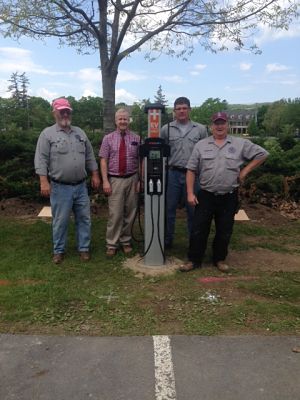
This project was made possible with the support of Facilities and Colgate’s trade shops. Special thanks to Hoyt Kelly (Electric Shop), Dan McCoach (Associate Director of Facilities), Jim Hall (Electric Shop) and Lenny Zielasko (Mason).
You may have noticed a growing number of all-electric vehicles cruising around campus. Besides a few Colgate-owned vehicles, proud owners include faculty, staff, and an increasing number of alumni and parents of current students. As the popularity of electric vehicles continues to grow, Colgate decided it was time to further support this emerging technology.
On May 22, we installed our first electric vehicle charging station on Lally Lane (adjacent to the Zipcar parking spots) near Donovan’s Pub. The dual arm Level 2 ChargePoint station has the capacity to charge two cars at once. Colgate offers free charging for the first 5 hours with a $2.00 per hour rate after that. It can take anywhere from 3-6 hours to get a full charge (depending on the make and model of the car). The ChargePoint station will connect to any make and model of electric vehicle (though Tesla owners will need to use their adapter). The station is also user-friendly and networked permitting owners to check availability and/or status of their vehicle through a smartphone app.
Over 10 percent of Colgate’s campus carbon footprint is due to commuter emissions and our vehicle fleet. By providing infrastructure to support electric vehicles we are helping car owners overcome one of the key barriers to purchasing electric vehicles: range anxiety. Even though current models of electric vehicles, such as the Nissan LEAF®, can typically travel over 80 miles on a single charge, a lot depends on speed, topography, load, and accessory use which can drive down battery life. Even if your driving habits reduce the range to 60 miles per full charge, this is still well within range of most all faculty and staff commuters. Despite this, having a charging station on campus can help to reduce anxiety. And for those who just can’t get over range anxiety, advanced designs like the Chevy Volt, offer the best of both worlds. An onboard gasoline powered generator can provide electricity only when the battery is depleted.
An electric vehicle is much greener and cheaper to own than gasoline-powered cars. Assuming the typical electric vehicle owner charges their car at home overnight, it would cost about 50¢ to drive 40 miles on Hamilton electric rates or about $1.20 at NYSEG rates. Because most of our power is produced by hydroelectric energy, the carbon footprint of driving an electric vehicle in Central New York is near zero. Moreover, since almost all of our electricity is generated here in New York, switching from gasoline-powered to electric-powered vehicles can help to support our state economy while reducing dependence on imported oil.
For these reasons, we anticipate seeing more electric vehicles on the Colgate campus.


this is awesome. Great work.